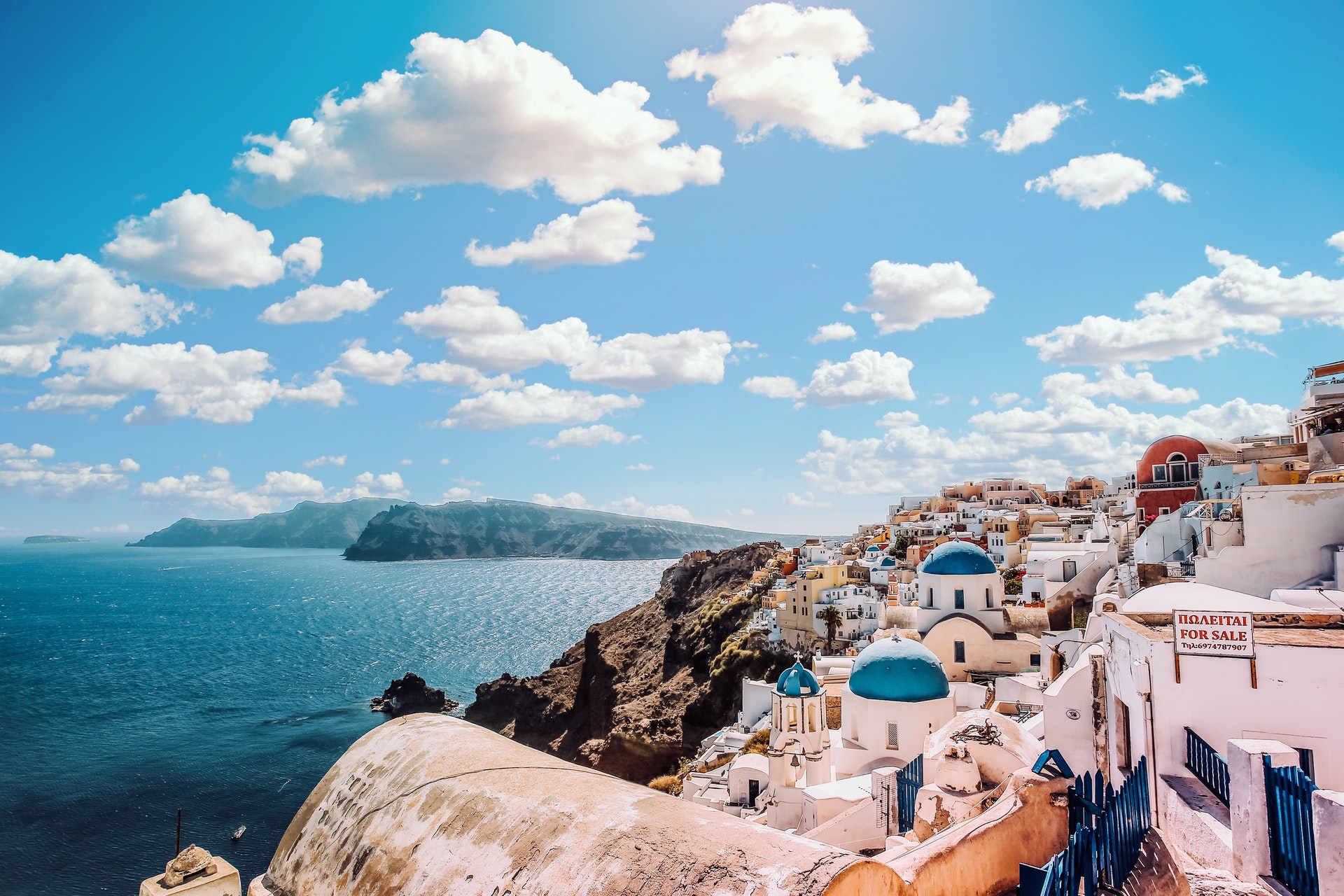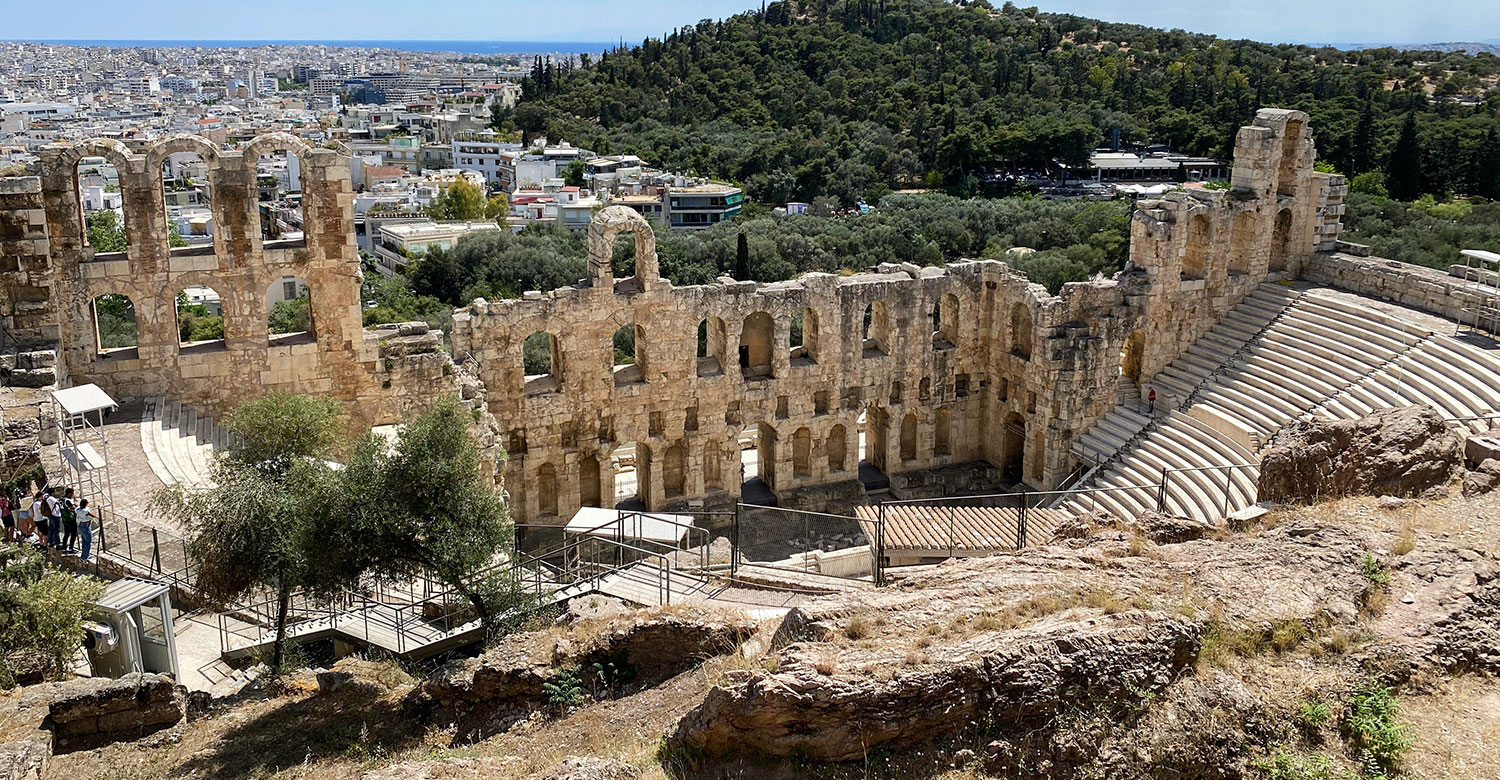
Greece Holiday Packages and Travel Deals
Greece Holiday Packages
PEACE OF MIND BOOKING PLAN
Cooling-Off Period
Change of Mind
On-Ground Support
Prices in AUD
Industry Accredited
Australian Owned & Operated
What our customers say
I found that this company were experts in travel to French Polynesia and they were amazing. There are some challenges traveling for a short trip from Australia with the time zones and limited flights and Lisa made things very easy and provided several quotes for different levels of accomodation. Could not recommend more highly and would use their service again!
Cassandra from Entire Travel arranged a perfect holiday for us at Le Moana in Bora Bora. The flights and transfers worked seamlessly, our overwater bungalow was perfectly positioned and staying on Matira Point was like being in paradise! I was so happy with how well the trip was put together for us.
Awsome Holiday! The best experience Perfectly planned for less hassle 👌 Thank you Cassandra for your help We will definitely be using Entire Travel Group on our next adventure
Tina and the team have now planned 5 holidays for my wife and I, and each trip just seems to get better. No matter what staff member we work with or country we travel to the team are highly knowledgeable, responsive and friendly. We cannot rate the team high enough. We recommend them to all of our friends. Thank you Tina and the team!
Helpful Information
Greece has a Mediterranean climate with plenty of sunshine, mild temperatures and a limited amount of rainfall.
Due to the country's geographical position, its rugged relief and its distribution between the mainland and the sea, there is great variation in Greece's climate.
- Summer: June - September In summer, the dry hot days are cooled by seasonal winds called the meltemi, while mountainous regions have generally lower temperatures.
- Winter: November - March - The winters are mild in lowland areas, with a minimum amount of snow and ice, yet, mountains are usually snow-covered. Moreover, a common phenomenon is the occurrence of different climactic conditions during the same season (for instance, mild heat in coastal areas and cool temperatures in mountainous regions).
Welcome to Greece! Χαίrετε! A beloved destination and in addition to the more familiar islands, the mainland offers plenty of options for a classic Mediterranean holiday. You’ll find peaceful fishing villages full, old fortified towns and fulfilling cities for your next city break. Visit Greece's archaeological sites, enjoy its fascinating culture, its spectacular coastline and its picture-perfect scenery!
The islands are the main characteristic of Greece’s morphology and an integral part of the country’s culture and tradition. Greek sovereign land includes 6,000 islands and islets scattered in the Aegean and Ionian Seas, of which only 227 islands are inhabited. This is a truly unique phenomenon for the European continent.
The Greek Archipelago takes up 7,500 km of the country’s total 16,000 km coastline, offering a highly diversified landscape: beaches stretching over many kilometers, sheltered bays and coves, sandy beaches with sand-dunes, pebble beaches, coastal caves with steep rocks and dark colored sand typical of volcanic soil and coastal wetlands.
- New Years Day: 1st of January
- Epiphany: 6th of January. Sea water is consecrated in the area of Piraeus. The priests throw the Cross into the sea and young men dive to catch it.
- Ash Monday: 41 days before Easter. It is the day people begin the Lent. On Ash Monday Greeks fly kites, eat meatless food and celebrate Koulouma. Athenians gather on Philopappou Hill.
- Independence Day & Celebration of Evaggelismos: 25th of March. Military parade.
- Easter: From Holy Friday until Easter Monday. On Holy Friday evening every church decorates the Epitaph (Bier of Christ). During the procession of the Epitaph the streets of every city or village in the country are full of people. It is a religious procession where everybody holds lit candles in their hands and sings hymns.
- Night of the Resurrection: It is celebrated in midnight before Easter Sunday with fireworks and candles.
- Easter Sunday: On Easter Sunday Greeks eat barbecue lamb. The celebrations include singing and dancing all day long.
- Labor Day: 1st of May. Flower feasts all around Athens.
- Pentecost: It is celebrated 50 days after Easter.
- Assumption of the Virgin Mary: 15th of August.
- 28th of October: National Celebration. Military parade.
- Christmas: 25th-26th of December.
Health No special vaccinations or immunizations are needed when travelling to Greece.
Safety Greece is considered as one of the safest destination countries in the world. Travelers are, of course, advised to use the normal precautions that they would in any other European country.
Emergency Numbers
- European emergency number: 112
- Ambulance Service: 166
- SOS Doctors : 1016
- Duty Hospitals and Clinics: 1434
- Pharmacies: 1434
- Poisoning First Aid: 210 77 93 777
- Police: 100
- Tourist Police: 1571
The Electric Current in Greece is 230V AC (50Hz). An adapter is required.
Greece is a Member-State of the European Union, and has signed the Schengen Agreement. While traveling within the E.U., you only need your Identity card. However, a passport is necessary for a number of other transactions, such as currency exchange, purchases, etc.
Citizens coming from countries that have not yet joined the Schengen Area may require a visa to enter Greece. The E.U. visitors from these countries can acquire further information from the Hellenic Embassies or Consulates in their countries, or from their travel agencies. Before visiting Greece, please consult the detailed information on the Ministry of Foreign Affairs' website and find out whether you require a Visa (Australian citizens can currently travel visa-free).
Note: During your stay in Greece, if you require a Visa, you are advised to have suitable insurance coverage for emergency medical or other needs.
Although the official language is Greek, a large majority of people in the tourist industry speaks English. English is also part of the standard school curriculum, therefore, most Greek’s will have a good command of the English language as well as a few other languages as well (ex. French, German, Italian etc).
Greek is a particularly difficult language to pick up, so no one will be upset if you do not speak any Greek. Greeks are friendly people who are always eager to help and love it when they hear a stranger speaking their language. So, when planning your trip to Greece, try to learn a few common Greek words like ‘please’ (parakalo), ‘thank you’ (efharisto) and ‘hello’ (yasou) and you will get a favourable response as you try to communicate with the locals.
Street signs in the cities are typically bilingual, but if you’re heading further afield, it’s worth learning the Greek alphabet as well, to help you navigate.
Searching for further European travel options? Experience a range of destinations with our Europe holiday packages.
Greece has 15 International airports mostly located on the islands and the cities, receiving direct international flights of regular and special airlines, as well as charter flights. Travelling across the country is simple with many connections with every part of Greece.
WHY WE LOVE Greece
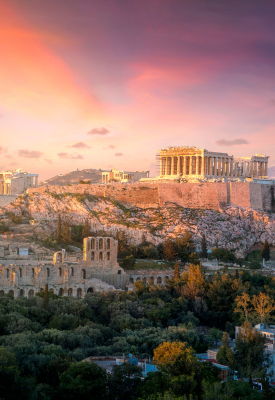 Ancient ruins and whitewashed villages
Ancient ruins and whitewashed villages
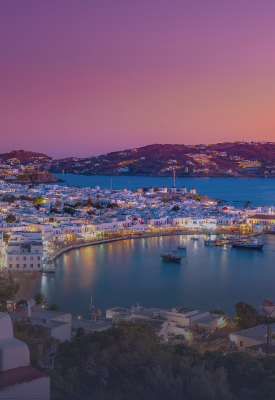 Island-hopping in the Aegean Sea
Island-hopping in the Aegean Sea
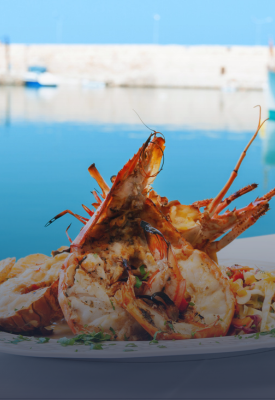 Fresh seafood by the harbour
Fresh seafood by the harbour
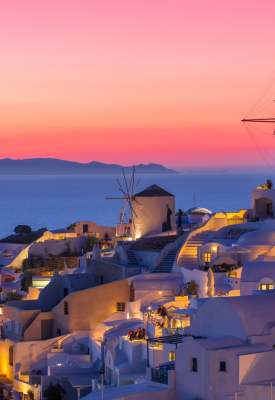 Sunsets in Santorini and beyond
Sunsets in Santorini and beyond
